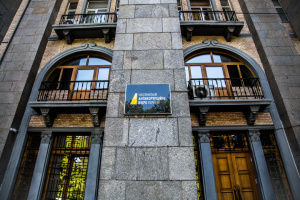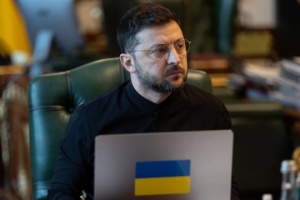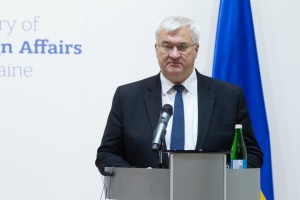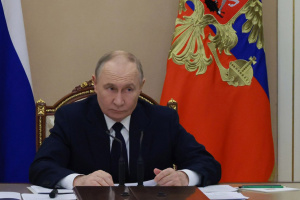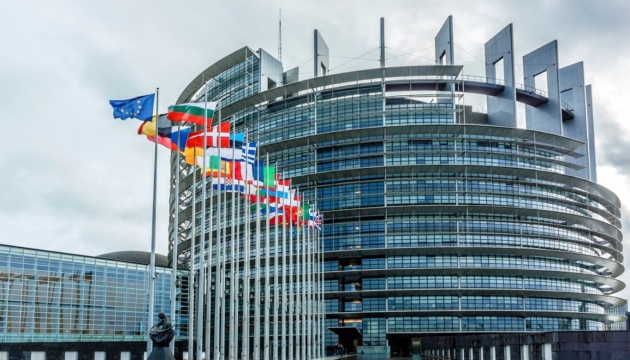
European Parliament passes resolution on continued support for Ukraine
A total 495 MEPs backed the document, 137 voted against it, and 47 abstained.
"The European Parliament... reaffirms its positions on the continued support for the independence, sovereignty and territorial integrity of Ukraine within its internationally recognised borders and the unwavering commitment of the EU to providing political, financial, economic, humanitarian, military and diplomatic support for as long as it takes to secure Ukraine’s victory," the document emphasizes.
The resolution reaffirms the validity of all previous decisions passed by the European Parliament in the period from February 19, 2014, when Russia annexed the Ukrainian Crimea, captured parts of Luhansk and Donetsk regions, and unleashed aggression against Ukraine, which continued with full-scale invasion on February 24, 2022.
The preamble of the resolution recognizes Ukraine's right to self-defense and the courage of the Ukrainian people in the fight against Russian aggression, their resistance to systematic atrocities by Russian invaders in the occupied territories and indiscriminate attacks against the civilian population and civil infrastructure.
The resolution also reflects the consistent support that the EU and its member states provide to Ukraine in the fight against Russian aggression. This includes the allocation of about EUR 95 billion in financial, humanitarian and military aid. Of this amount, about EUR 32 billion is precisely military aid, within the framework of which the EU intends to allocate another EUR 21 billion "until 2025". The EU Auxiliary Military Mission in Ukraine (EUMAM Ukraine) has trained more than 52,000 Ukrainian servicemen. In addition, NATO allies have pledged to provide Ukraine with $40 billion in military aid in 2025.
The text also mentions the "uncoordinated and surprising" visit by Viktor Orbán, Prime Minister of Hungary, which holds the EU presidency, to Russia and China in June, and reaffirms that the Hungarian leader did not represent the interests of any EU institution or its member states. At the same time, the deputies condemned the actions of Hungary, which abuses its right of veto in the Council of the EU to block significant amounts of aid to Ukraine, including military aid within the framework of the European Peace Facility. At the same time, European politicians expressed support for President Zelensky’s "Peace formula" and the corresponding efforts being made by Ukraine.
One of the points in the introductory part of the resolution emphasizes that the Russian war against Ukraine is an attack against the entire West and its values.
"Russia’s war of aggression against Ukraine is part of a broader set of objectives against the West, against our democracy and our values. [The European Parliament] welcomes the outcome of the NATO Summit and reiterates its belief that Ukraine is on an irreversible path to NATO membership," the document emphasizes.
At the same time, MEPs reaffirm the previously announced proposal to annually allocate 0.25 percent of the national GDP for military support to Ukraine by the EU and NATO member states.
The deputies called on the member states to increase the defense production by the European industry, to increase the supply of weapons and ammunition to Ukraine, and to cancel the restrictions on the use of such weapons by Ukraine against military targets on the territory of the Russian Federation.
The resolution calls on member states to make a coordinated effort to establish a special international tribunal to hold Russia and its political leadership accountable for war crimes and crimes against humanity, as well as the crime of aggression against Ukraine.
Deputies supported the use of profits derived from Russian assets immobilized in the EU for military support to Ukraine, as well as the decision of the G7 countries to allocate a loan of $50 billion to Ukraine, which will be covered and serviced at the expense of such profits.
The document proposes that the EU Council continue and strengthen the policy of sanctions against Russia and Belarus, closely monitor its effectiveness, as well as take resolute action to prevent circumvention of such restrictive measures.
In the adopted resolution, MEPs welcomed the start of EU intergovernmental negotiations with Ukraine and Moldova regarding membership, and called the entry of these countries into the EU "a geostrategic and democratic opportunity and an investment in a united and strong Europe." At the same time, they emphasized that the accession process should be based on the achievements of each country and on the fulfillment of criteria, including the development of democracy, rule of law, fight against corruption, and observance of fundamental rights.
European politicians called on the European Commission to draft a long-term plan to support Ukraine in its recovery, taking into account the experience of activities within the framework of the Ukraine Facility in the multi-year EU budget for 2024-2027.
As reported earlier, the inaugural plenary session of the newly elected European Parliament is being held in Strasbourg. Yesterday, the lawmakers re-elected the incumbent head of the European Parliament, Roberta Metsola for the next 2.5 years. Tomorrow, July 18, there will be a debate and vote on the extension of the mandate of European Commission President Ursula von der Leyen for the next term.

